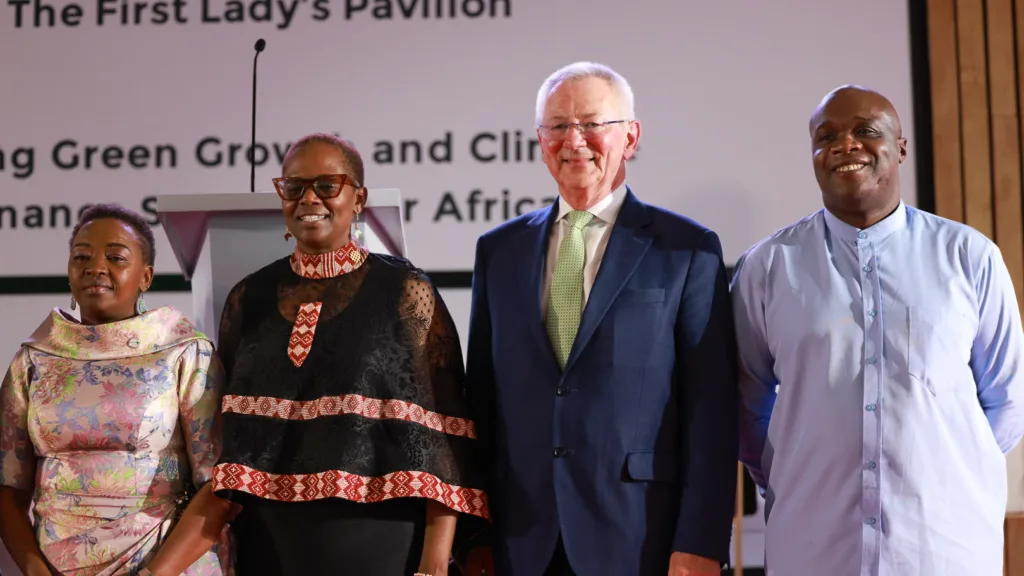The Bezos Earth Fund has revealed a commitment of $22.8 million to expedite the rejuvenation of two significant African ecosystems crucial for carbon capture, biodiversity preservation, and human welfare: the Greater Rift Valley in Kenya and the Lake Kivu and Rusizi River Basin spanning the Democratic Republic of Congo, Rwanda, and Burundi.
This funding announcement was made by Andrew Steer, President and CEO of the Bezos Earth Fund, during the Africa Climate Summit held in Nairobi, Kenya. Earlier, Her Excellency Mrs. Rachel Ruto, the First Lady of Kenya, and Her Excellency Pastor Dr. Dorcas Rigathi, the Second Lady of Kenya, stressed the pivotal role of restoration in empowering vulnerable communities to revitalize their surroundings and livelihoods. First Lady Ruto put forth an ambitious vision to enlist African First Ladies as advocates for grassroots, women-led restoration efforts across the continent.
The funding is part of the Earth Fund’s $1 billion commitment to landscape restoration globally. It also adds to the $42.2 million granted previously to accelerate Africa’s restoration movement, known as AFR100, and complements recent funding from The Audacious Project and Norway’s International Climate and Forest Initiative (NICFI).
The grants, currently undergoing the application process, will support the rehabilitation of 600,000 hectares of deteriorated land in two vital regions: the Greater Rift Valley, known for Kenya’s water resources and regional agricultural production, and the Lake Kivu and Rusizi River Basin, part of the world’s second-largest rainforest and home to five million people. This large-scale restoration effort has the potential to sequester 42 million metric tons of carbon dioxide equivalent by 2050, which is equivalent to removing more than 9.3 million gasoline-powered vehicles from the road each year.
The grants will encompass the following initiatives:
- Offering technical assistance to community groups and restoration enterprises in both regions. This support will focus on various aspects, including remote sensing, restoration techniques, nursery management, marketing, and financial management.
- Providing multi-year support for the organizational development of grassroots African restoration organizations.
- Strengthening the value chains for products and services generated through restoration, while also attracting development finance, public funds, and private investments into restoration projects and businesses.
- Conducting research and development to enhance the supply and quality of native tree seeds, which is currently a bottleneck in achieving annual tree planting targets in these landscapes.
- Monitoring changes in land cover and the impacts of restoration using data from the Land & Carbon Lab.
“Locally led and managed restoration efforts are more likely to deliver long term success and can bring climate and biodiversity benefits along with economic prosperity for communities. The bottom line is without local leadership, local wisdom, and passion, scaling restoration across Africa would be impossible,” said Wanjira Mathai, the Earth Fund’s advisor for Africa and Managing Director at the World Resources Institute. “Already, Africa is home to some of our planet’s greatest restoration successes, and this funding will support locally led restoration to re-green our beautiful African continent.”
“Africa is at the forefront of the restoration economy. Thousands of entrepreneurs across the continent are demonstrating that landscape restoration is not just good for the environment, but creates jobs and generates economic returns,” said Mamadou Diakhité, Head of the Climate Change and Environmental Sustainability Division at the African Union Development Agency (AUDA-NEPAD) and lead of the AFR100 Secretariat. “These kinds of green jobs are essential for Africa’s youth. Africa is a young continent and an entrepreneurial one. We are ready for investment.”
The grants currently in progress include partnerships with organizations such as the Albertine Rift Conservation Society (ARCOS), the Barka Fund, World Agroforestry, the Green Belt Movement, Maliasili, Rabo Foundation, and Regeneration. These collaborations aim to empower local actors, secure private investment, improve seed access, provide training, and facilitate the growth of community-based conservation and agroforestry projects in the specified regions.
